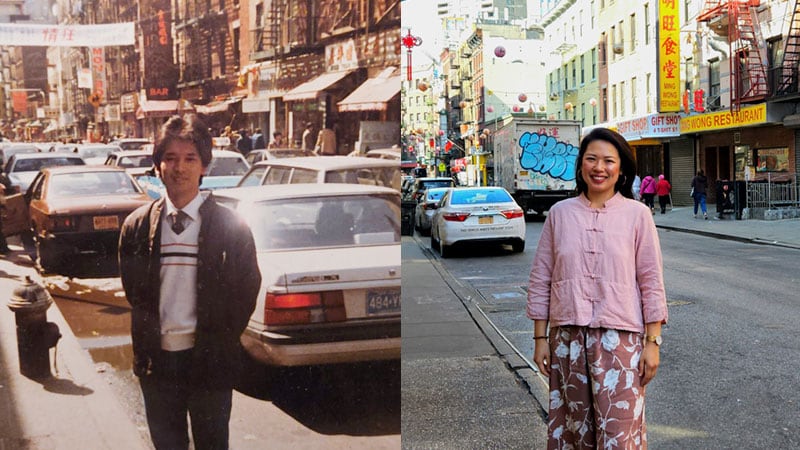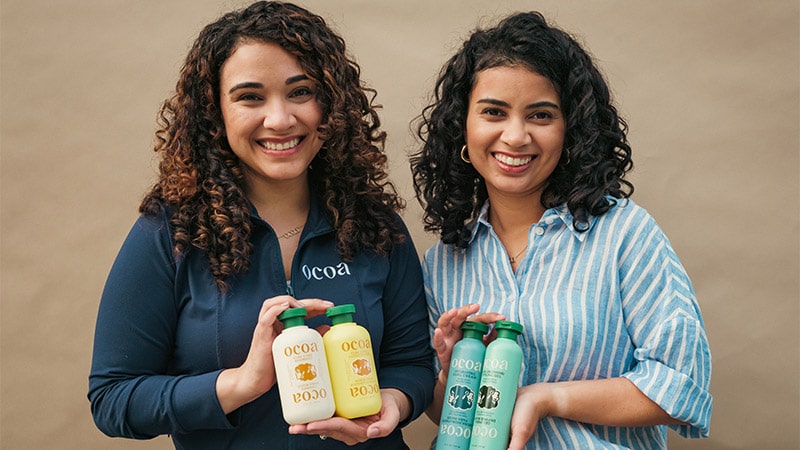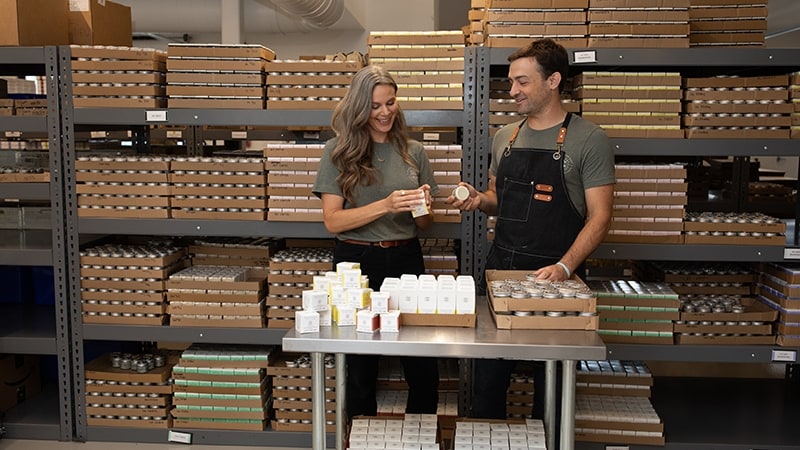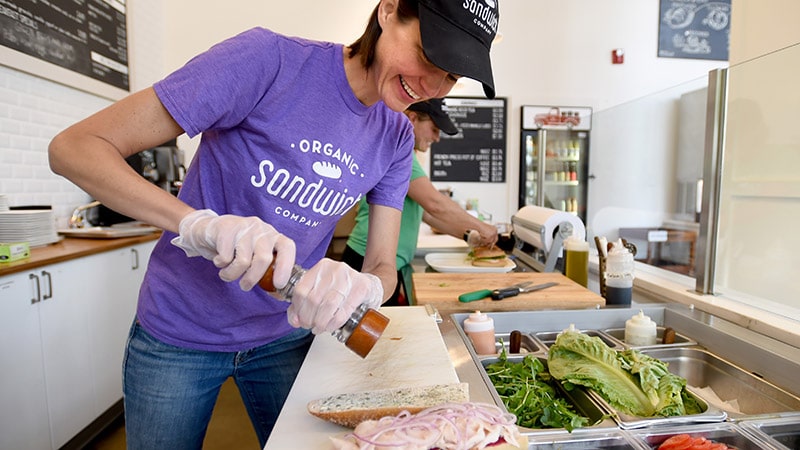"I realized that I was quite done with working behind a desk"
Chi Sum Ngai and Kaleena Teoh of Coffee Project New York Presented by Chase for Business.
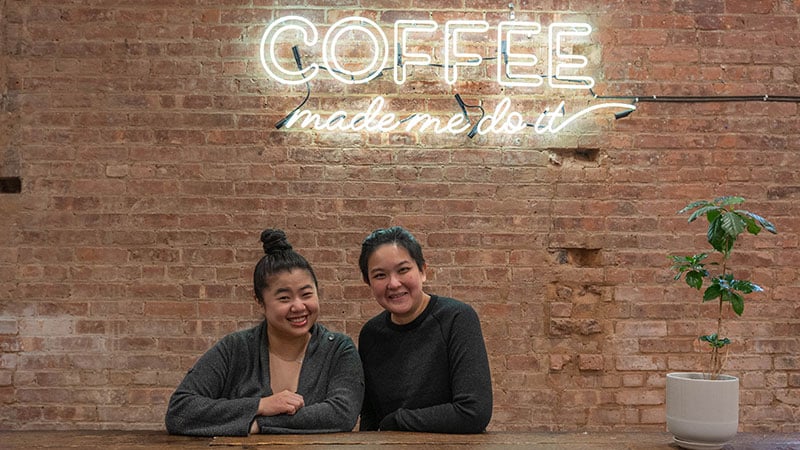
Participants compensated
What Entrepreneurs Are Really Made Of:
What drives entrepreneurs to carve their own path? We’re interested in getting beyond the stereotypes and meeting the real faces of entrepreneurship in America. Each story in this series explores what it is that makes entrepreneurs different — and how that difference translates into success
Chi Sum Ngai and her partner, Kaleena Teoh, had never run a business or worked in the coffee industry before they founded Coffee Project New York in 2015. As Asian women in the LGBTQ+ community, they didn’t look like the business owners who were already succeeding in the largely white and male world of specialty coffee.
Within a year, TimeOut New York magazine named their shop "New York’s most-loved café."Opens overlay They’ve since opened two more locations, as well as a roastery and the state’s only Specialty Coffee Association Premier Training Campus.
We caught up with them late on a Monday afternoon. They entered the Zoom session seated shoulder to shoulder in front of an unadorned white wall. They were already mid-conversation — smiling and gesturing, eyes lighting with warmth as they realized the video call had begun. Introductions came easily, and soon, we were talking about their early days in the coffee business.
"You can see them thinking, 'Oh, two Asian women behind the bar. Do they really know what they’re doing?'"
The origin story
Take us into your first few days as business owners. What was it like to start your own coffee shop?
Chi Sum Ngai: When we opened the first shop, we weren’t what people expected. We had times when people would open the door, hesitate and then just walk back out. And you can see them thinking, "Oh, two Asian women behind the bar. Do they know what they’re doing?"
Kaleena Teoh: They didn’t trust us to make a good cup of coffee. A specialty cup of coffee.
Ngai: But we’re not those people who will let something fail that we started. It’s not part of our personality. We always feel like failure is when you say, "This is the end." We believe that as long as we keep going and pull our stuff together, it will never be the end.
Teoh: The experience didn’t really discourage us. It encouraged us to educate ourselves and just be better versions of ourselves. Not to prove to other people but to prove to ourselves that we got this.
Where does that attitude come from? Is it something you had to learn?
Teoh: Growing up in a Chinese family in Malaysia, being the firstborn, there are a lot of expectations. But being a girl, there are headwinds, too. My mom had the defiant idea that I should have access to the same opportunities as any guy. And my parents instilled the mentality that as long as you put your mind to it, you’ll figure out a way to achieve your goal.
Ngai: My mom was very adamant that I was given the same opportunity to learn things that I wanted to learn. Growing up, I never really felt like, "Oh, being a girl is a bad thing." But of course, when you start working, things happen to you, and you realize like, "Oh, OK, it’s a little more difficult to get the opportunity."
Did that translate into wanting to start a business and create your own opportunities? Did you see yourselves as future CEOs?
Ngai: I never thought I’d be an entrepreneur to start off. I thought I’d be a nine-to-five, suit-up-and-go-to-work-type person. But working in IT, I experienced pretty bad burnout. Pretty soon, I realized that I was quite done with working behind a desk.
So, I started talking to Kaleena about quitting our jobs and doing something we both love. We both love hanging out in coffee shops, so I decided to pick coffee. That was in 2015. I just told Kaleena, "I just want to quit my job. How about you quit your job, and then we do coffee together?"
Teoh: The idea was to create a mom-and-pop shop.
Ngai: We wanted just a place where people would come in the morning and grab their coffee and tell you about their lives, like, "Oh, I couldn’t sleep yesterday, blah, blah, blah." A hangout spot.
So, you both quit your jobs and decided to do coffee in a city that has literally thousands of coffee shops. What helped you beat the odds?
Ngai: We’re both very different, and we’ve learned when to rely on what each of us brings. And we never give up. Kaleena is very analytical; I’m super emotional. So, when she’s being too analytical on certain things and worrying too much, I’ll eventually say, "What is there to lose? We’re young — in our 20s. We have time. And if this fails, we just have to start over."
Teoh: Sum can make decisions quickly. I’ll take my sweet time, read everything, analyze everything. I’m the one who’s usually holding back a little bit, and then she’s the one who is go, go, go. I think our personalities complement each other well that way. She’s very creative, and I’m a very meticulous person. Together, we generate more options. Once we have our minds set on a certain goal, we’re very good at coming up with ways to reach that goal.
Neither of you worked in the coffee industry before. Kaleena, you worked for a nonprofit helping people with developmental disabilities. Did that experience apply to starting a coffee business?
Teoh: Helping people with disabilities instills a lot of empathy in you, and empathy is how we run the company. Putting people first. I guess it goes back to how Chi Sum and I met. We actually met volunteering in a UNICEF mentoring program back in Malaysia. Mentoring has always sort of been in our life. We’ve always been doing this.
Ngai: Yeah, that’s right.
Teoh: We see ourselves as mentors. And we’re trying to lead by example. Things that we ask our team members to do, we would do ourselves. That way, nobody feels like, "You’re just asking me to do this because you can’t do it or because you don’t want to."
Ngai: That’s part of why I spent so much time on my education in coffee. For me to be able to lead my team, I need to have enough coffee knowledge myself, beyond brewing and roasting. I got my certification in Q gradingOpens overlay , which is assessing the quality of green coffee beans with a defined point scoring system.
And that’s where I learned that there’s so much more that consumers don’t see about the lives of people producing coffee. Often, it’s these big families who put in so much hard work and pride but, at the end of the harvest, maybe get only a couple hundred bucks. And this makes it hard to send their kids to school or have clean water. So, a lot of people have second jobs just to make sure they can still plant coffee.
The lens on the world
We tend to think of coffee as a commodity industry. How do you bring empathy to that?
Teoh: Our company mission is to improve the quality of life for everyone in the coffee supply chain. And that goes from the farmer who is planting the tree and the people who are processing and fermenting the coffee to the roasters and even our clients, our customers.
Many of our coffees come from small cooperatives and family farms where they focus on improving working conditions, wages and benefits for farmworkers. We also purchase directly from producers or cooperatives, which ensures price transparency and traceability and strengthens the global coffee community. When we can’t use direct trade, we work with responsible importers who care about the livelihoods of coffee farmers.
In our stores, we train our baristas to tell people about the coffee and where it comes from. So, when customers drink a cup of our coffee, instead of just thinking it’s a cup of coffee, they think about all the people who prepare it for them.
Ngai: It helps us form really deep connections with our customers.
So, you teach your customers to have empathy, too?
Teoh: At the very beginning, we came up with the idea of trying to get people to go from drinking espresso to appreciating espresso. We saw that a lot of people just order a latte without thinking that lattes are actually just milk — a lot of milk with a little bit of espresso. And we’re like, "How do we change the way customers think when they’re standing in line looking at their phones and flipping through Instagram?"
So, we had our first project — we named it Project Number One back then — our deconstructed latte. You have a shot of espresso, a cup of frothed milk and a little cookie to go with it as a palate cleanser. And it’s presented nicely on the plank.
Number one, it looks pretty. So, you have people just generally interested in the product because it looks pretty, and they can Instagram it. And then, once you get them, you start explaining where the coffee is from, where we source the milk, why we drink it this way. The whole experience allows people to appreciate that a shot of espresso — ask any barista in a specialty coffee shop, and they’ll tell you — is the hardest thing to make. Because there’s nowhere to hide.
Ngai: I just want to piggyback on that a little bit, about the customer relationship. It is so important, because coffee is just like wine. You can buy a $3 bottle of wine or a $3,000 bottle. And you can have coffee that’s $2.50 or $250. If you don’t build that relationship with your customer to start with, and you present a $20 cup of black coffee, you will always get judged.
Teoh: Yeah, it’s like you’re just being a snob.
Ngai: Right. A snob trying to get attention.
Teoh: Exactly.
Ngai: When, actually, it’s the opposite. You’re going out of your way to care about other people’s work.
"A lot of companies see barista as just another low-wage job. We see it as the entry point to a career in coffee if you want it"
You mentioned your staff earlier. How did you get your empathy to show up in your staff relationships?
Ngai: People feel comfortable coming to apply for jobs in Coffee Project New York because of our identity as women who are Asian and part of the LGBTQ+ community. I interview most of the baristas, and I hear scary stories like, “I was not given this opportunity because I’m a Black barista.” Often, people feel comfortable being completely upfront with me, like, “I don’t mind, if you pay me less than the big companies offer, as long as I know that you’re paying me the same as everyone else with my skills.”
Teoh: Our baristas are very diverse. We have people from a Korean background, from a Thai background, from New York, from across the country. Straight, nonbinary, LGBTQ+ — you name it. We pride ourselves on that, and it’s a very, very inclusive group of people.
We often get the feedback, “You have a really good team.” It’s because we are all people who care about coffee, people who care about the customer. It’s just the company culture.
Being a barista is often seen as more of a job than a career. But you’ve created an entire academy to train baristas. What’s that about?
Ngai: There’s this idea that people who work in the coffee community can’t afford to live in New York City because we are often paid minimum wage. So, for me, it’s like, “I want to break this cycle. First, I’m going to start with my barista. I want my barista to be able to, like, one day afford a car, buy an apartment, go on vacation, get health benefits.”
A lot of companies see barista as just another low-wage job. We see it as the entry point to a career in coffee if you want it. All the people in our major positions — head of production, head of wholesale, managers, operations manager — started as a barista in Coffee Project New York.
Teoh: It’s very important to us that we can provide them with the opportunity to grow. To us, it’s also to retain talent. If we don’t, we’re just going to go back to square one, and we’ll be working late doing every job ourselves again.
Ngai: When we hire a new barista, we discuss where they want to go next — be it education, roasting, managing — or whether they just want to be a barista. We put them on a pathway that we know is going to land them where they want to go. This is not just a job for them to pay bills anymore.
Teoh: If we can align the company’s goal with the team member’s goal, then we’re all heading in the right direction, and everyone will be happy at the same time.
How does this focus on supply chain and staff translate to your results as a business?
Teoh: Our team has helped us build connections with regular customers. And our customers are more than just fans of good coffee; they are people who genuinely want us to succeed. The agent who helped us find the property for our second location was a regular at our first location. The architect who designed our third shop was a regular at our second location. At some point, our team and our customers have become a community that has helped us grow.
Down to business
What has been your biggest lesson as business owners?
Ngai: How to be flexible. I always want to do things my way. I think that explains why I was working in IT. Because in IT, there’s usually one right way to do something. When you start a business, you have to experiment. You have to collaborate. That’s the fun.
Teoh: A lot of people think opening a business is about the thing they make. It isn’t. You’ll have an issue with a pipe today. Tomorrow, the nitrogenator won’t make nitro coffee. You need to be OK with the fact that you’re there to fix problems.
What’s more important for an entrepreneur: being resourceful or having a clear vision for growth?
Ngai: Having that clear goal. Knowing what you want to do and setting realistic expectations. Anybody can set goals, but are they realistic? That’s something different.
Teoh: Staying flexible is more important. Being observant and able to recognize an opportunity.
If you could launch Coffee Project over again, what would you do differently?
Ngai: Marketing. Back when we started in the East Village, we did zero marketing. For two years! If we’d started earlier, we’d have generated enough business to hire our team much sooner.
What’s most important in choosing a vendor or partner: referrals and track record or intuition based on personal interaction?
Teoh: Referral. It’s word-of-mouth. Someone recommends them and already had a good experience with them — that’s my go-to.
Is it more important to always think ahead about what could go wrong or trust that you can solve problems when they arise?
Ngai: I trust I can solve a problem when it arises.
Teoh: For me, it’s thinking ahead about what can go wrong.
Is it more important to ask customers what they want or intuit what they need?
Ngai: I think it’s both. Part of our work is about sharing an experience. So, it’s both educating and learning.
Teoh: I also think it’s a balance. The mission is important. But you need to assess and be sure you’re relevant.
What do you value most about your Chase for Business relationship?
Ngai: Being able to partner with people who also believe in goodwill, who believe in different people, different races and who respect women.
Teoh: The seamlessness. It reflects the attitude of our relationship banker, of the people who work at Chase, and it makes us really comfortable.
What is your go-to coffee order?
Ngai: Americano with soy milk
Teoh: Straight-up black coffee. A lot of people ignore it because it’s so basic. But if you have solid drip coffee, you’ve got a solid foundation. That’s what I order if I go to another coffee shop.
